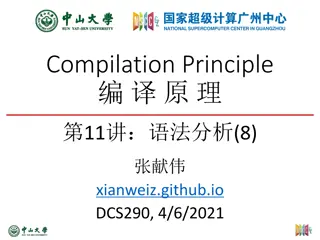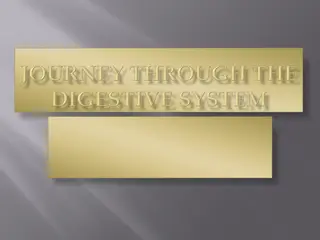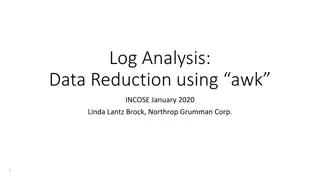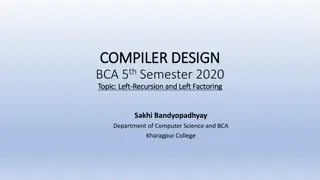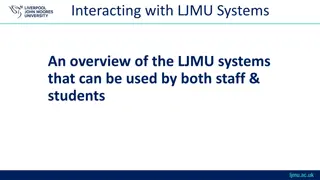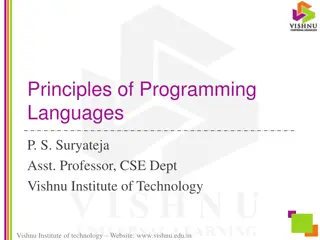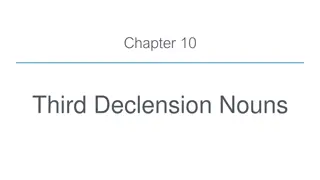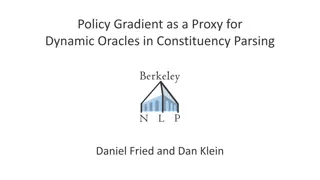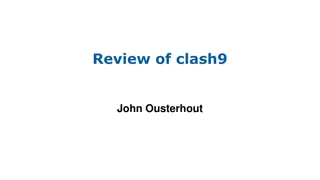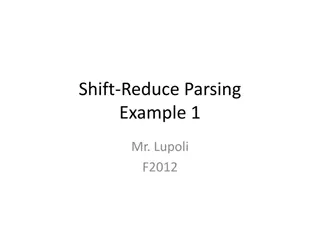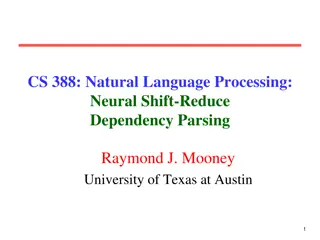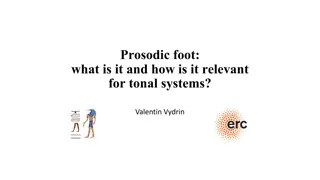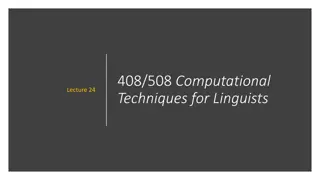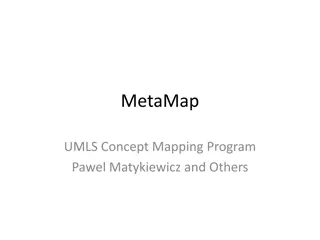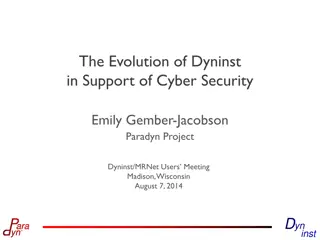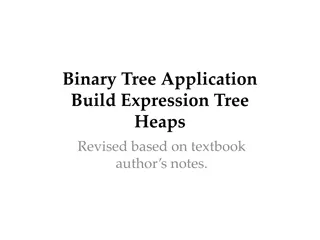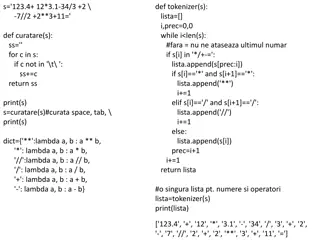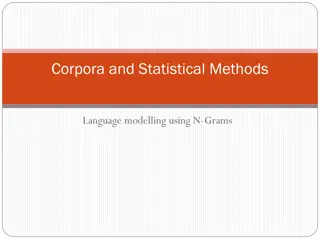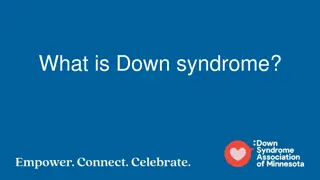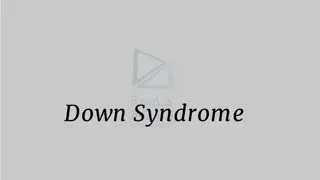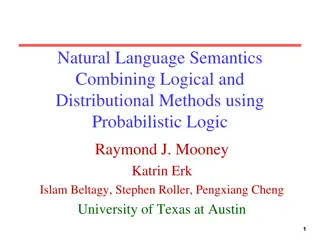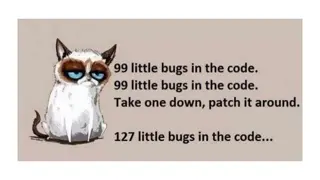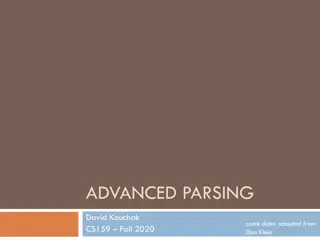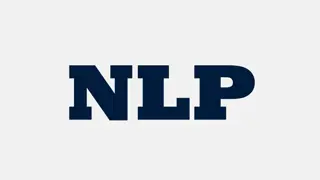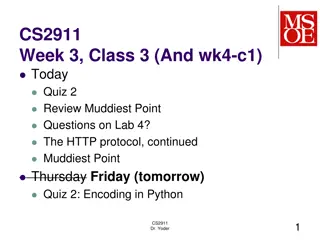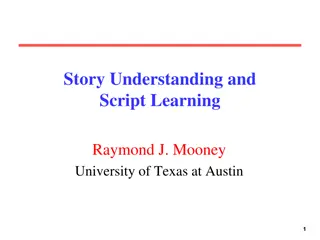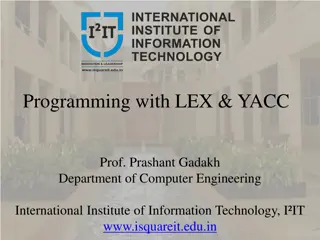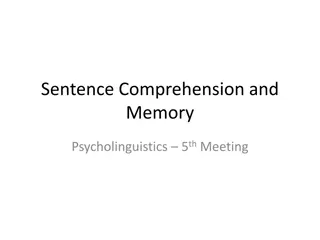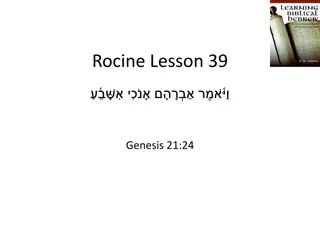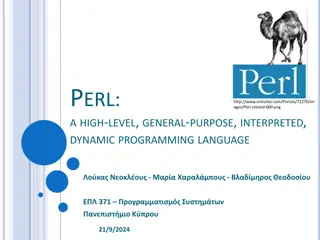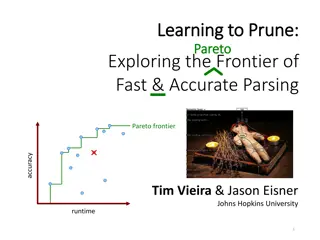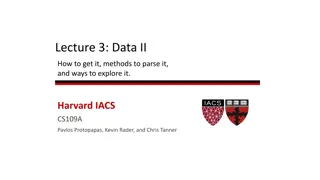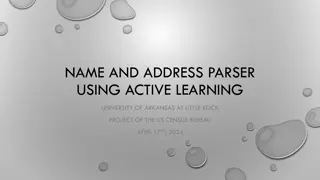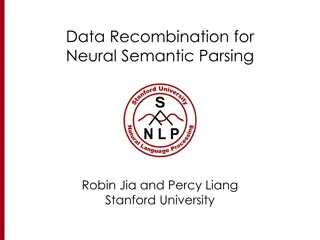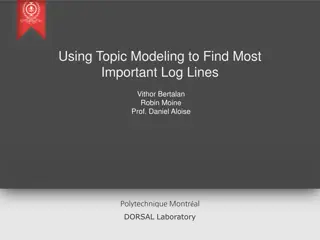Understanding LR Parsing and State Merging Techniques
The content discusses LR parsing techniques such as LR(0), SLR(1), LR(1), LALR(1), and their advantages in resolving shift-reduce and reduce-reduce conflicts. It also delves into state merging in LR parsing, highlighting how merging states can introduce conflicts and affect error detection in parser
0 views • 29 slides
The Digestive Journey: From Skittles in the Mouth to Nutrient Absorption in the Intestine
The process begins with chewing skittles in the mouth, where salivary amylase breaks down sugar. The bolus then travels down the esophagus via peristalsis into the stomach, further broken down by gastric juice. The pancreas releases enzymes like amylase and lipase to digest sugars and fats. Bile pro
1 views • 15 slides
Efficient Log Analysis and Data Reduction Using AWK
Learn how AWK and regex can streamline log analysis and data reduction tasks, saving you time and effort compared to manual methods like Excel. Discover how these tools excel at parsing columns of data, enabling advanced lexical analysis and efficient comparison of log files.
0 views • 15 slides
Understanding Left Recursion and Left Factoring in Compiler Design
Left recursion and left factoring are key concepts in compiler design to optimize parsing. Left recursion can be problematic for top-down parsers and needs to be eliminated using specific techniques. Left factoring is a method to resolve ambiguity in grammars with common prefixes, making them suitab
0 views • 15 slides
Understanding LJMU Systems for Staff and Students
Explore LJMU systems utilized by staff and students, such as the Student Information System, CRM, Web Hub, and more. Learn about processes like access requests, file parsing, use of gradebook templates, and the Web Hub's role as a comprehensive business intelligence tool. Discover how these systems
0 views • 14 slides
Principles of Programming Languages at Vishnu Institute of Technology
Introduction to Principles of Programming Languages course including prerequisites, objectives, outcomes, and syllabus at Vishnu Institute of Technology. The course covers key concepts, popular programming paradigms and languages, practical knowledge in lexical analysis and parsing, as well as writi
0 views • 43 slides
Understanding Third Declension Nouns and Translation Practice
Delve into the nuances of third declension nouns through parsing exercises and translation tasks. Explore examples and enhance your comprehension of Latin with warm-up activities and in-depth analyses. Improve your skills with exercises focusing on various grammatical elements.
0 views • 32 slides
Dynamic Oracle Training in Constituency Parsing
Policy gradient serves as a proxy for dynamic oracles in constituency parsing, helping to improve parsing accuracy by supervising each state with an expert policy. When dynamic oracles are not available, reinforcement learning can be used as an alternative to achieve better results in various natura
0 views • 20 slides
Workshop on Fine-grained Measurements App with P4 Programmable Switches
Explore the world of P4 programmable switches in a workshop hosted by the University of South Carolina. Learn about P4, programmable data plane switches, packet parsing, queue monitoring, and applications with P4 switches. Discover the shift from traditional networking to SDN, overcoming limitations
1 views • 19 slides
Comprehensive Review of Clash9 Framework by John Ousterhout
This review delves into the Clash9 framework designed by John Ousterhout, covering key aspects such as classes, main functions, ClashParser, Executor, SubstrParser, and more. The framework involves parsing commands, executing built-in commands, managing variables, configuring pipelines, and handling
0 views • 21 slides
Understanding Shift-Reduce Parsing Example in Mr. Lupoli's F2012
This example explains shift-reduce parsing by tracing the input to the original start symbol. It demonstrates how shifting and reducing operations work in parsing mechanics, using the given original production and syntax rules for matching and reduction steps.
0 views • 16 slides
Neural Shift-Reduce Dependency Parsing in Natural Language Processing
This content explores the concept of Shift-Reduce Dependency Parsing in the context of Natural Language Processing. It describes how a Shift-Reduce Parser incrementally builds a parse without backtracking, maintaining a buffer of input words and a stack of constructed constituents. The process invol
0 views • 34 slides
Understanding Prosodic Foot and Its Relevance in Linguistics
The prosodic foot is a vital unit in linguistic analysis associated with stress and word prominence. It serves as an intermediary between syllables and words, influencing tonal systems and phonological structures through patterns like metrical parsing and foot-headedness. Language-specific manifesta
11 views • 20 slides
Exploring Computational Techniques with NLTK for Linguists
Dive into the world of computational techniques for linguists with NLTK in Lecture 24. Learn about list comprehensions, conditional forms, tokenization, part-of-speech tagging, parsing, chunking, concordance, similarity, common contexts, dispersion plots, and more. Discover where NLTK is installed o
0 views • 22 slides
Understanding MetaMap: Overview of Concepts and Functionality
MetaMap is a concept mapping program developed by Pawel Matykiewicz and others. It assists in mapping medical terms to concepts in the UMLS database. The program involves input formats, the algorithm, MetaMap options, output formats, and creators. Key features include parsing using SPECIALIST tools,
5 views • 24 slides
The Evolution of Dyninst in Cyber Security
The evolution of Dyninst in support of cyber security explores various aspects including different types of binary programs, security challenges, offensive and defensive strategies, adaptation techniques, better parsing methods, and the use of hybrid static and dynamic analysis. The content highligh
1 views • 19 slides
Expression Tree Construction: Building Fully Parenthesized Expression Trees
In the process of building expression trees, nodes are inserted based on operators and operands, creating a fully parenthesized expression. The construction involves parsing the expression, inserting new nodes as tokens are examined, and linking nodes accordingly. By following the steps for handling
0 views • 17 slides
Programmable Parser and Header Definitions at University of South Carolina
Programmable parsers and custom header definitions play a crucial role in network packet processing. This presentation by Jorge Crichigno at the University of South Carolina covers topics such as parser operation, predefined states, and header formats. The content delves into the capabilities of pro
1 views • 22 slides
Mathematical Operations Parser and Evaluator
This program reads a mathematical expression, tokenizes it, and evaluates it based on the order of operations. It demonstrates parsing infix to postfix notation and evaluating postfix expressions. The code contains functions for cleaning input, tokenizing expressions, and calculating results, along
0 views • 11 slides
Understanding N-Gram Models in Language Modelling
N-gram models play a crucial role in language modelling by predicting the next word in a sequence based on the probability of previous words. This technology is used in various applications such as word prediction, speech recognition, and spelling correction. By analyzing history and probabilities,
0 views • 101 slides
Understanding Down Syndrome: Causes, Effects, and Characteristics
Down syndrome, also known as Trisomy 21, is a genetic condition caused by the presence of an extra 21st chromosome. Discovered by Dr. John Langdon Down in 1866, this condition affects individuals in various ways, influencing their development and abilities. People with Down syndrome may learn skills
0 views • 10 slides
Understanding Down Syndrome: Types, Characteristics, and Impacts
Down syndrome is a genetic condition caused by an extra chromosome, typically chromosome 21. This leads to physical and cognitive challenges, with individuals exhibiting unique abilities. The syndrome presents with distinctive physical features, such as flattened face, almond-shaped eyes, and poor m
2 views • 14 slides
Natural Language Semantics: Combining Logical and Distributional Methods
Explore the integration of logical and distributional methods in natural language semantics, including the use of probabilistic logic, FOPC, Montague Semantics, semantic parsing, and more. Delve into the rich representation of knowledge, semantic compositionality, and the mapping of natural language
0 views • 43 slides
Building interactive interpreter for Calculator Language with REPL, Parsing, and Lexical Analysis
This project involves creating a user interface similar to a Read-Eval-Print Loop (REPL) for programming languages. Users can input text representations of expressions, which are then parsed, evaluated, and errors are handled accordingly before displaying the expression's value. Additionally, the st
0 views • 22 slides
Understanding Advanced Parsing Techniques for NLP Evaluation
Delve into the realm of advanced parsing with a focus on evaluating natural language processing models. Learn about tree comparison, evaluation measures like Precision and Recall, and the use of corpora like Penn Treebank for standardized parsing evaluation. Gain insights on how to assess parser per
0 views • 50 slides
Analyzing Discourse Structures in Natural Language Processing
This content explores various aspects of NLP including discourse analysis, parsing, rhetorical relations, and argumentative zoning. It delves into understanding text structures, relationships, and the use of different rhetorical devices. Examples and illustrations are provided to aid comprehension a
0 views • 8 slides
Review of Quiz 2 Topics: Encoding in Python, Binary Representations, and Parsing Messages
Today's session covered a review of Quiz 2 topics focusing on Encoding in Python, Binary Representations, and Parsing Messages. Key points included understanding why different types of data cannot have unique types in Python, recognizing the significance of 0d0a in HTTP body, discussing exercises fr
0 views • 10 slides
Evolution of Natural Language Processing in AI Research
The evolution of Natural Language Processing in AI research from the 70s and 80s focused on knowledge representation, complex inference, story understanding, and script learning. Concepts like Conceptual Dependency and Scripts were developed to represent meaning and improve text understanding. Howev
0 views • 58 slides
Introduction to Lex and Yacc: Compiler Design Essentials
Lex and Yacc are essential tools in compiler design. Lex serves as a lexical analyzer, converting source code to tokens, while Yacc is a parser generator that implements parsing based on BNF grammars. Through these tools, strings are processed, and code is generated for efficient compilation. This i
0 views • 10 slides
Understanding Sentence Comprehension and Memory in Psycholinguistics
Sentence comprehension involves parsing, assigning linguistic categories, and utilizing syntactic, semantic, and pragmatic knowledge. The immediacy principle and wait-and-see approach play roles in the processing of sentences. Figurative language and the challenges in parsing sentences are also disc
0 views • 26 slides
Understanding Niphal Yiqtol: Analysis and Interpretation
Explore the intricacies of Niphal Yiqtol, focusing on identifying and reading the verb form. Delve into the presence of consonantal augments, dagesh variations, and assimilated Niphal Nun, providing insights into verb parsing and root meaning.
0 views • 25 slides
Introduction to Perl Programming Language
Perl is a high-level, general-purpose, interpreted, dynamic programming language created by Larry Wall. It is known for its practical extraction and reporting capabilities, robust shell scripting, and support for CGI scripts. Perl is celebrated for its modularity, case-sensitivity, and extensive lib
0 views • 27 slides
Understanding Top-Down Parsing in Context-Free Syntax
Context-free syntax expressed with context-free grammar plays a key role in top-down parsing. This parsing method involves constructing parse trees from the root down to match an input string by selecting the right productions guided by the input. Recursive-descent parsing, Rule Sentential Forms, an
0 views • 17 slides
Exploring Fast & Accurate Parsing With Learning to Prune
In this informative content, the concept of learning to prune is discussed in the context of exploring the frontier of fast and accurate parsing. It delves into the optimization tradeoff between runtime and accuracy in end-to-end systems, showcasing a Pareto frontier of different system performances
0 views • 42 slides
Exploring Data Acquisition and Parsing Methods in Data Science
This lecture covers various aspects of obtaining and parsing data, including methods for extracting web content, basic PANDAS commands for data storage and exploration, and the use of libraries like Requests, BeautifulSoup, and PANDAS. The Data Science Process is highlighted, emphasizing the importa
0 views • 42 slides
Introduction to NLP Parsing Techniques and Algorithms
Delve into the world of Natural Language Processing (NLP) with a focus on parsing techniques like Cocke-Kasami-Younger (CKY) and Chart Parsing. Explore challenges such as left recursion and dynamic programming in NLP, along with detailed examples and explanations of the CKY Algorithm.
0 views • 42 slides
Enhancing Name and Address Parsing for Data Standardization
Explore the project focused on improving the quality of name and address parsing using active learning methods at the University of Arkansas. Learn about the importance of parsing, entity resolution, and the token pattern approach in standardizing and processing unstructured addresses. Discover the
0 views • 11 slides
Understanding Bottom-Up and Top-Down Parsing in Computer Science
Bottom-up parsing and top-down parsing are two essential strategies in computer science for analyzing and processing programming languages. Bottom-up parsing involves constructing a parse tree starting from the leaves and moving towards the root, while top-down parsing begins at the root and grows t
0 views • 29 slides
Advances in Neural Semantic Parsing
Delve into the realm of neural semantic parsing with a focus on data recombination techniques, traditional parsers, and the shift towards domain-general models. Explore the application of sequence-to-sequence models and attention-based neural frameworks in semantic parsing tasks. Discover the evolvi
0 views • 67 slides
Utilizing Topic Modeling for Identifying Critical Log Lines in Research
By employing Topic Modeling, Vithor Bertalan, Robin Moine, and Prof. Daniel Aloise from Polytechnique Montréal's DORSAL Laboratory aim to extract essential log lines from a log parsing research. The process involves building a log parser, identifying important log lines and symptoms, and establishi
0 views • 18 slides
